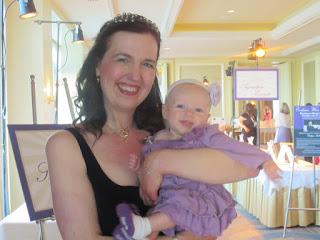The Name Game

I was thinking about baby names long before I was pregnant, though I was several months into my pregnancy before I settled on my daughter's name. I would try out different names, think about them for a while, try to imagine calling my child that as she grew up. By the time of my baby shower I was sure enough to tell my friends. At the end of the shower a friend's ten-year-old daughter patted my pregnant stomach and said "goodbye, Mélanie." The name was starting to seem inextricably intertwined with this little creature who kicked with increasing vigor.
My daughter, Mélanie Cordelia, is named after two characters in my books, with a nod to Shakespeare. Just a couple of yeas ago I was naming the character Cordelia, who appears in my recently released Imperial Scandal. I went through a similar process to the one I went through naming my baby - making lists, trying out names. Save that the character who would become Cordelia already had a very clear personality in my mind. That's where naming a character is different from naming a child. The character is usually already a fully formed adult. And of course one doesn't have to worry the character will hate you as a teenager for choosing that particular name.
Sometimes I struggle over character names, other times they seem obvious to me. While it took me a long time to settle on Cordelia's name (and on Harry for her estranged husband), I knew almost instinctively that Cordelia's sister should be named Julia. Last month, just before Imperial Scandal was published, I was having dinner with a friend in New York. We started talking about Brideshead Revisited, and only then did I realize that the two sisters in Brideshead are named Julia and Cordelia. Very different characters from my Cordelia and Julia, but subconsciously I must have remembered when I named my characters, if only in the sense that those two names seemed to go together. The tricky thing of course about naming characters is that one doesn't know what conscious and subconscious associations readers will bring to the names one chooses.
In naming a character a writer struggles with not only what fits the character but also with what name that character's parents might have chosen when the character was as much an unknown as my unborn daughter was when I named her. I went through several names for the hero's sister in Beneath a Silent Moon before I realized her half-French mother would have given her a French name. Suddenly not only was the name obvious, but her character fell into place. The historical novelist also has to deal with what names were in historical usage. A real challenge when family trees of the era reveal a multitude of George, Edwards, and Johns. This becomes particularly problematic in an ongoing series. Yes, a set at Almack's might have been made up of two Georges and two Elizabeths with two Edwards and two Annes in the next set over, but in a novel the reader will get confused. Yet, going back to the question of what names the parents might pick, some characters' parents would be likely to pick conventional names. And then there's the real historical character who suddenly cries out to pop into one's fictional narrative and happens to share a name with an already established fictional character. Or two historical figures who share a name - the book I just finished features Sir Charles Stuart, real life British diplomat, and Charles, Lord Stewart, real life British diplomat/soldier. One can only imagine the confusion at diplomatic soirées, especially as both men were known for their amorous intrigues.
When I find the "right" name for a character, it's soon hard for me to imagine them as anyone else. Just as it's now hard for me to imagine my daughter as anyone but Mélanie Cordelia.
Do names affect the way you view a character? Have characters in books changed the way you feel about a particular name? How important is historical accuracy to you in character names? Writers, what are the particular challenges you face in naming characters?

Comments
Post a Comment